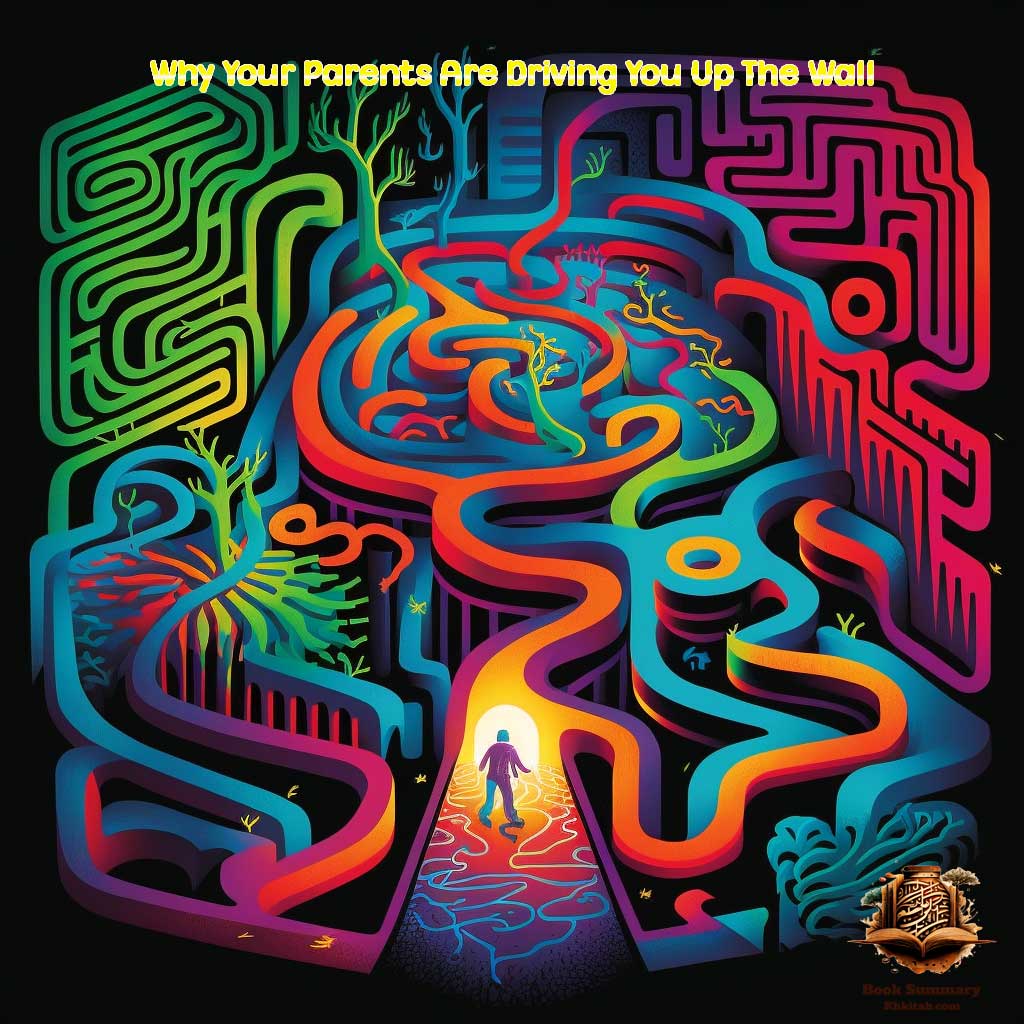Why Your Parents Are Driving You Up The Wall Book Summary

In “Why Your Parents Are Driving You Up The Wall” author Dean Burnett embarks on an insightful journey to unravel the complexities of the relationship between teenagers and their parents. The book delves deep into the neuroscience behind the behaviors and decisions of adolescents, and how parents interpret them. While Burnett sheds light on brain development and its influence on reactions and choices, he also highlights how understanding and effective communication can offer a solution to the challenges families face during this critical phase of life.
Table of Contents
Why is Adolescent Brain Development So Pivotal in Understanding Teen Behavior?
Understanding the adolescent brain is integral to decoding the seemingly unpredictable behaviors of teenagers. The book “Why Your Parents Are Driving You Up The Wall” highlights this crucial phase of brain development, emphasizing its profound impact on teen actions, emotions, and decisions. One of the most transformative areas during this period is the prefrontal cortex, a region responsible for decision-making, impulse control, and evaluating consequences.
During adolescence, the prefrontal cortex is still in its development phase. This underdevelopment can often lead to impulsiveness, risk-taking, and difficulty in comprehending long-term consequences. The book provides insight into how these neural changes can sometimes make teens appear rebellious or unthoughtful in their actions. It’s a time where neural pathways are being formed, pruned, and solidified.
The intriguing aspect is that while these transformations can lead to challenging behaviors, they are also responsible for the enhanced creativity, passion, and energy commonly associated with teenagers. This phase is not merely about challenges; it’s also about immense potential. By understanding the intricacies of adolescent brain development, both parents and teens can better navigate the tumultuous years of adolescence, fostering mutual respect and empathy. The knowledge also underscores the importance of providing teens with supportive environments where they can explore, make mistakes, and learn in safe spaces, paving the way for their eventual transition into mature, well-adjusted adults.
Our Facebook Page – Book Summary
Why Do Teenagers Often Make Impulsive Decisions? Insights from “Why Your Parents Are Driving You Up The Wall.”
Teenagers, known for their vibrant energy and zest for life, often confound adults with their seemingly impulsive and risky decisions. The book “Why Your Parents Are Driving You Up The Wall” offers a profound understanding of this phenomenon. One cannot merely label teenagers as ‘reckless’ without understanding the underlying neuroscience. The core reason, as explained in the book, lies in their evolving cognitive functions.
The adolescent brain, especially the prefrontal cortex, is in a stage of rapid development. This region, responsible for executive functions like judgment, decision-making, and impulse control, is yet to mature fully during the teenage years. As this area of the brain continues to develop, teens may lean towards immediate gratification, often overlooking potential long-term consequences.
Furthermore, the book brings to light the fact that while these impulsive decisions might be seen as troublesome by adults, they play an essential role in the teen’s journey of self-discovery and learning. Experimentation, even if it results in mistakes, is an invaluable part of their growth process, shaping their understanding of the world and their place within it.
However, recognizing the neuroscience behind such behaviors isn’t a free pass for reckless actions. Instead, it serves as an enlightening guide for parents and caregivers, offering a more empathetic lens through which they can support and guide their teens. By understanding the intricate workings of the adolescent brain, we can foster environments that encourage responsible decision-making while still allowing space for exploration and learning.
Positive parenting – Book Summary (khkitab.com)
Why Do Parents Often Misunderstand Their Teens? Insights from “Why Your Parents Are Driving You Up The Wall.”
Navigating the complex landscape of adolescence is challenging not just for teens but also for their parents. “Why Your Parents Are Driving You Up The Wall” sheds light on this intricate dynamic by exploring the mature cognitive processes of parents and how these can often lead to misunderstandings with their teenage children.
Parents, with their fully developed prefrontal cortices, operate from a place of experience and foresight. Their cognitive functions have reached a maturity that allows them to foresee consequences, calculate risks, and make decisions based on long-term outcomes. This mental framework, enriched by past experiences, often clashes with the still-developing cognitive processes of their teens.
The experiences from their youth, the challenges they faced, and the lessons they learned play a pivotal role in shaping a parent’s reactions and expectations. They might view their teen’s behavior through the lens of their past, sometimes leading to overprotectiveness or unjustified criticisms. This past-oriented perspective can make it challenging for parents to understand the unique struggles and pressures that today’s adolescents face in the digital age.
Moreover, the societal changes, technological advancements, and evolving cultural norms that have emerged over the years can create a generational gap. This gap can lead to misconceptions, with parents potentially misjudging their teen’s actions based on outdated contexts.
It’s crucial, as highlighted by the book, for parents to strike a balance: valuing their life experiences while also making an effort to understand the modern challenges their teenagers confront. Recognizing this balance is the key to bridging the gap and fostering a healthy parent-teen relationship, allowing both sides to grow, understand, and support one another.
Why Do Parents and Teens Often Misunderstand Each Other? Insights from “Why Your Parents Are Driving You Up The Wall”
Navigating through the tumultuous world of adolescence isn’t just challenging for teenagers but for their parents too. Dean Burnett’s book “Why Your Parents Are Driving You Up The Wall” offers a deep dive into the inherent communication gaps and misunderstandings that often transpire between these two groups, underlining the generational differences in cognition and worldview.
One key point the book touches on is the evolving cognitive framework of teenagers, attributed largely to the rapid development in their prefrontal cortex. This part of the brain, responsible for decision-making, risk assessment, and emotional regulation, undergoes significant changes during adolescence. As a result, teenagers might often appear impulsive or irrational from an adult perspective, making choices that seem baffling to their parents.
On the flip side, parents, with their fully developed frontal lobes, often operate from a standpoint of accumulated experiences. They’ve been through their share of life’s roller coasters, and these experiences shape their perceptions, biases, and reactions. They remember the mistakes they made, the lessons they learned, and naturally wish to shield their children from similar pitfalls. However, their protective instincts, when combined with generational differences in upbringing, technology, and culture, can come across as overbearing or out-of-touch to their teens.
The digital age has further widened this generational gap. Parents might struggle to relate to the pressures of social media, online bullying, or even the simple dynamics of digital friendships – concepts that are second nature to today’s youth. These differences can lead to a feeling of being misunderstood on both sides, where teens feel their concerns are trivialized, and parents feel their advice goes unheeded.
In essence, “Why Your Parents Are Driving You Up The Wall” underscores the importance of mutual understanding and empathy. By recognizing these inherent differences and working towards bridging the communication gap, both parents and teens can foster a relationship based on respect, trust, and mutual growth.
How Do Hormonal Changes Impact the Tumultuous Parent-Teen Relationship? Insights from “Why Your Parents Are Driving You Up The Wall.”
Navigating the waters of adolescence is complex. It’s a phase marked by not just physical growth, but significant emotional and mental transformation. One of the primary catalysts behind these alterations? Hormones. In Dean Burnett’s enlightening book, “Why Your Parents Are Driving You Up The Wall,” the intricate relationship between teenage hormonal changes and the often challenging dynamics with parents is explored in depth.
During adolescence, the body undergoes a massive surge in various hormones, most notably, testosterone and estrogen. These hormones not only dictate physical changes, such as the development of secondary sexual characteristics, but they also play a crucial role in shaping emotions, behaviors, and even cognitive functions. For teens, this sudden rush can sometimes translate to heightened emotions, impulsiveness, and a stronger desire for independence.
For parents, interpreting and navigating these changes in their children can be daunting. What once were predictable behaviors now seem erratic. The calm child of yesteryears might now be a tempest of emotions, leading to increased misunderstandings and conflicts. Burnett’s book highlights the importance of recognizing these hormonal influences as a natural part of growth. It’s not about rebellion or willful disobedience; it’s about a biological metamorphosis that every individual must traverse.
Moreover, the book emphasizes the value of open communication between parents and teens during these trying times. Hormonal changes might be inevitable, but with understanding, patience, and dialogue, the associated challenges can be manageable. By shedding light on these often-misunderstood aspects of adolescence, Burnett offers both parents and teenagers a roadmap to better understand each other and, ideally, reduce the number of walls between them.
How Can Teenagers and Parents Bridge the Communication Gap? Insights from “Why Your Parents Are Driving You Up The Wall.”
It’s a universally acknowledged truth that the teenage years can be fraught with tension and misunderstanding between parents and their children. However, is it inevitable? Or can specific strategies help bridge this communication chasm? In Dean Burnett’s insightful book, “Why Your Parents Are Driving You Up The Wall,” there’s a focus on actionable advice for both parties. Let’s delve into the core principles he recommends.
Active Listening: Often, the issue isn’t about not speaking but not listening. Active listening involves fully concentrating, understanding, and responding to what the other person is saying. For parents, this means giving your teenager the space to express themselves without immediately jumping to conclusions or advice. For teenagers, it means genuinely hearing out your parents’ concerns and recognizing that their intentions are often rooted in care and love.
Avoiding Assumptions: Assumptions are the silent killer of meaningful conversations. Whether it’s a parent assuming their teenager is being rebellious for the sake of it, or a teenager believing their parent is ‘out of touch’ with modern times, these assumptions prevent genuine understanding. Burnett’s book emphasizes the importance of asking open-ended questions to get to the heart of the matter.
Setting Boundaries: This strategy is pivotal. It’s about acknowledging that while open dialogue is essential, there should also be boundaries in place. This can be as simple as designating a time to discuss critical issues when both parties are calm or agreeing on ‘safe words’ that signal when someone feels unheard or overwhelmed.
Empathy Building: At its core, most conflicts arise from a lack of empathy. By placing oneself in the other’s shoes, it becomes easier to understand their perspectives. Role-playing exercises or simply taking the time to reflect on the other person’s feelings and viewpoints can go a long way in building empathy.
Seek External Guidance: Sometimes, it can be beneficial to involve a third party, like a counselor or therapist. They can provide neutral ground and professional strategies for better communication.
Burnett’s “Why Your Parents Are Driving You Up The Wall” is more than just an exploration of generational divides. It’s a guidebook filled with practical advice, illuminating the complexities of the parent-teenager relationship. By implementing these strategies, families can hope to transform their interactions from confrontational to cooperative. And in doing so, they build a foundation for mutual respect and understanding that lasts well beyond the teenage years.
Why is Empathy the Key to Bridging the Gap Between Parents and Teens? Insights from “Why Your Parents Are Driving You Up The Wall.”
Navigating the turbulent waters of adolescence can often seem like an insurmountable challenge for both parents and teenagers alike. The emotional rollercoaster that characterizes these formative years is intensified by changing dynamics in the parent-child relationship. The question then arises: how can this gap be bridged? One of the core themes highlighted in Dr. Dean Burnett’s “Why Your Parents Are Driving You Up The Wall” is the power of empathy and patience.
- Understanding Empathy: Empathy, at its core, is about placing oneself in another’s shoes. For parents, this means recalling the uncertainties and struggles of their teenage years. For teens, it involves recognizing the pressures and responsibilities that come with parenthood. When both sides make a concerted effort to understand the other’s perspective, conflicts can be seen in a different light.
- The Role of Patience: Adolescence is a time of exploration, identity formation, and boundary testing. It’s also a period of immense growth and change, both physically and mentally. As such, it’s inevitable that teens will make mistakes. Patience from parents, combined with constructive guidance rather than criticism, can foster an environment where teens feel safe to learn and grow.
- Benefits of Mutual Respect: Dr. Burnett emphasizes that mutual respect stems from empathy and patience. When parents show respect for their teen’s growing autonomy and teens show respect for their parents’ experience and wisdom, a foundation is laid for more open and effective communication.
- Empathy in Action: It’s not enough to just understand the concept of empathy; it needs to be actively practiced. This might mean parents actively listening without immediately jumping to conclusions, or teens trying to communicate their feelings more clearly rather than shutting down.
- The Bigger Picture: Beyond just improving parent-teen interactions, fostering empathy and patience can have long-term benefits. It can equip teens with essential life skills, such as conflict resolution, understanding diverse perspectives, and building strong relationships.
In conclusion, while the teen years can be fraught with misunderstandings and emotional upheavals, they also offer an opportunity to strengthen family bonds. As highlighted in “Why Your Parents Are Driving You Up The Wall,” the journey might be smoother with a little more empathy and patience from both sides.
In “Why Your Parents Are Driving You Up The Wall,” the book delves into the challenges and shifts characterizing the parent-teen relationship. It spotlights how communication gaps and misunderstandings arise from the disparities in mental, physical, and emotional development between the two generations. However, at its core, the book sends a hopeful message: through sustained listening, practicing empathy, and exercising patience, a deeper understanding and stronger bond between parents and their children can be achieved. Adolescence, despite its hurdles, is a precious period of growth and discovery and can be a pivotal transitional phase that brings families closer together rather than driving them apart.
Why Your Parents Are Driving You Up The Wall Book Summary


